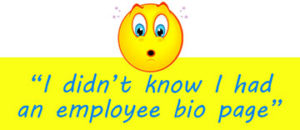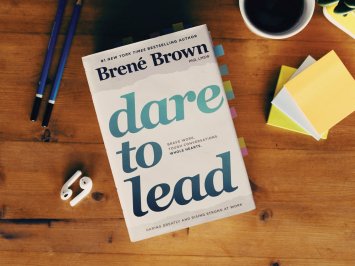 I am proud. I am proud of the leadership of GCC faculty and staff. Over the past few months I have seen faculty and staff courageously offer their thoughts and opinions of how to improve our district, campus, and our classrooms. The work of GCC faculty and staff have resulted in committees being created, campus calls to action, panel discussions, task force, etc. I wish I had the time and space to call everyone’s attention to several things that represent the sheer amount of tenacity, passion, and courage on our campus. I only have the time and the space to focus on one thing, so I will focus on the Reimagine Project.
I am proud. I am proud of the leadership of GCC faculty and staff. Over the past few months I have seen faculty and staff courageously offer their thoughts and opinions of how to improve our district, campus, and our classrooms. The work of GCC faculty and staff have resulted in committees being created, campus calls to action, panel discussions, task force, etc. I wish I had the time and space to call everyone’s attention to several things that represent the sheer amount of tenacity, passion, and courage on our campus. I only have the time and the space to focus on one thing, so I will focus on the Reimagine Project.
The Reimagine Project is a project that centrally focuses on encouraging faculty to reimagine their classrooms with high impact classroom strategies. I am one of the individuals responsible for teaching our cohorts a specific strategy and assisting them with implementation in the classroom. The program was launched this academic year. The purpose of the project is to encourage faculty to try these strategies so that we can create the best learning environments that we possibly can for our students.
The Reimagine Project is daring to lead because they are addressing an important question from Brene Brown’s book, Dare to Lead, which is: How do you cultivate braver, more daring leaders, and how do you embed the value of courage in your culture? Brown proposes doing it through vulnerability, values, trust, and learning to rise. Participants have to be vulnerable, which means being open to the process and trying new things in the classroom that they have never tried before. The program also encompasses all of GCC’s values which includes learning and quality. Participants also have to trust themselves and trust the facilitators guiding them through the experience. Finally, participants have to learn how to rise because they may experience failure along the way, and failure is not completely negative, it’s actually a lesson in disguise.
Shout out to to Jennifer Lane and Meghan Kennedy for creating the nuts and bolts of the program. Shout out to the institution for the support. Shout out to the participants who are engaged in the program. Shout out to the leads for guiding the participants through the strategy. I dare everyone to follow in their footsteps and dare to lead in the places and spaces of their profession. If you are already Daring to Lead, I encourage you to keep leading in this way, because you are having impact in the work that you do.


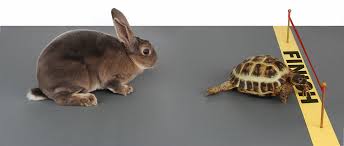
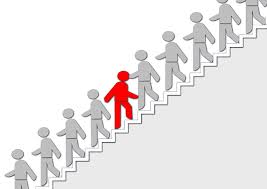
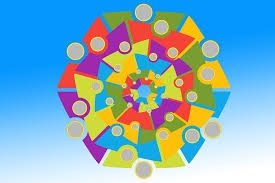
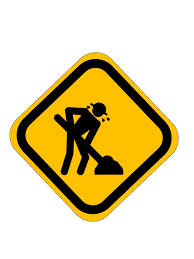

 Many people know that I love Oprah! I am of course subscribed to her podcast Oprah’s Super Soul Conversations. Yesterday I listened to the episode: Iyanla Vanzant: You Matter. Iyanla Vanzant is a woman who helps people overcome some major issues on a show on OWN called Fix My Life. When I saw the title of the podcast I had to listen and I was not disappointed. It perfectly aligns with what I have been talking about for the past few weeks. If you get a moment to listen, check it out.
Many people know that I love Oprah! I am of course subscribed to her podcast Oprah’s Super Soul Conversations. Yesterday I listened to the episode: Iyanla Vanzant: You Matter. Iyanla Vanzant is a woman who helps people overcome some major issues on a show on OWN called Fix My Life. When I saw the title of the podcast I had to listen and I was not disappointed. It perfectly aligns with what I have been talking about for the past few weeks. If you get a moment to listen, check it out. One of the many contributing factors to your self-esteem is social comparison (McCornack, 2016). Comparing ourselves to others impacts how we see ourselves. It’s our measuring stick. We use it to see how we size up against others. Social media has introduced society to the ultimate measuring stick. Every day we are inundated with posts and images of others we think are better than us, or are living the lives we want to live. Students see images of their friends graduating from universities, while they are here at the community college. Faculty see posts from colleagues who are getting published, being awarded grants, and obtaining Ph.D.’s. Staff see individuals getting promoted to higher positions in education and think to themselves, why not me? We feel like if we are not famous, or doing anything significant that is on the level of Michelle Obama or Oprah Winfrey, that we are not important, that we do not matter, and that we don’t have value or worth.
One of the many contributing factors to your self-esteem is social comparison (McCornack, 2016). Comparing ourselves to others impacts how we see ourselves. It’s our measuring stick. We use it to see how we size up against others. Social media has introduced society to the ultimate measuring stick. Every day we are inundated with posts and images of others we think are better than us, or are living the lives we want to live. Students see images of their friends graduating from universities, while they are here at the community college. Faculty see posts from colleagues who are getting published, being awarded grants, and obtaining Ph.D.’s. Staff see individuals getting promoted to higher positions in education and think to themselves, why not me? We feel like if we are not famous, or doing anything significant that is on the level of Michelle Obama or Oprah Winfrey, that we are not important, that we do not matter, and that we don’t have value or worth.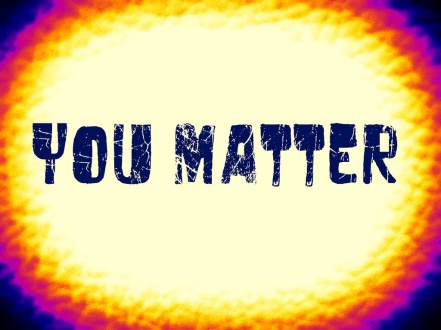 A message that has been on my heart lately is YOU MATTER. In order to be successful in anything that you do in life on a personal and professional level, you have to always remember these two important words. I truly believe that our success is dependent on it. How do you know that you matter? I think that it really starts in the mirror. When you look in the mirror, what do you see? Do you see a person of worth and value? Or do you see a person who is worthless and has no value? Your perception of yourself significantly impacts your actions.
I have worked in higher education since 2006. I’ve worked for community colleges and universities and I have worked with faculty, staff, students, administrators, and community organizations. I have witnessed the difference between individuals who believe that they matter and those who feel like they do not. Those who feel like they matter walk around with an air of confidence that radiates off of them. They work from a place of excellence and integrity because they know that the work that they do not only impact themselves but impacts others as well. They approach life ready to invest the time that is needed for success. If you don’t feel like you matter, every day can be a struggle. You may put in the work, but wonder if your efforts really mean anything at all.
At this point in my career, I feel like I matter. I feel like I am a person of worth and value and I am confident in the work that I do. Unfortunately, I have not always felt that way. I have been in the place where I felt like my efforts did not matter. To be perfectly honest with you, that was a tough place to be in, and it really hurts my heart when I come across people in life who feel this way. No one should ever feel like they don’t matter!!! It’s one of my missions in life to make sure that every person I come across in life feels like they matter. I want every person that I come in contact with to feel like they are a person of worth and value, I want people to feel like they matter.
For the next six weeks, I am going to focus on this theme: I matter, you matter, we matter. I hope that you will join me for the ride. I truly believe this message significantly impacts teaching, learning, student success, and life. =>)
A message that has been on my heart lately is YOU MATTER. In order to be successful in anything that you do in life on a personal and professional level, you have to always remember these two important words. I truly believe that our success is dependent on it. How do you know that you matter? I think that it really starts in the mirror. When you look in the mirror, what do you see? Do you see a person of worth and value? Or do you see a person who is worthless and has no value? Your perception of yourself significantly impacts your actions.
I have worked in higher education since 2006. I’ve worked for community colleges and universities and I have worked with faculty, staff, students, administrators, and community organizations. I have witnessed the difference between individuals who believe that they matter and those who feel like they do not. Those who feel like they matter walk around with an air of confidence that radiates off of them. They work from a place of excellence and integrity because they know that the work that they do not only impact themselves but impacts others as well. They approach life ready to invest the time that is needed for success. If you don’t feel like you matter, every day can be a struggle. You may put in the work, but wonder if your efforts really mean anything at all.
At this point in my career, I feel like I matter. I feel like I am a person of worth and value and I am confident in the work that I do. Unfortunately, I have not always felt that way. I have been in the place where I felt like my efforts did not matter. To be perfectly honest with you, that was a tough place to be in, and it really hurts my heart when I come across people in life who feel this way. No one should ever feel like they don’t matter!!! It’s one of my missions in life to make sure that every person I come across in life feels like they matter. I want every person that I come in contact with to feel like they are a person of worth and value, I want people to feel like they matter.
For the next six weeks, I am going to focus on this theme: I matter, you matter, we matter. I hope that you will join me for the ride. I truly believe this message significantly impacts teaching, learning, student success, and life. =>)
